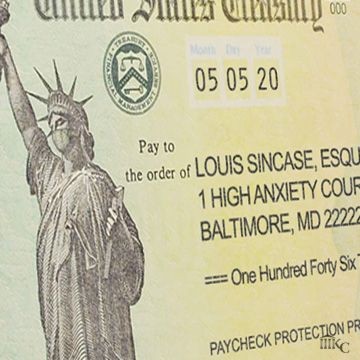The Lawyer's Lawyer
Protecting Your Paycheck
Q. I'm applying for a loan through the federal Paycheck Protection Program. I can probably survive without it, but if I use the funds to pay my staff, the feds will forgive the loan entirely and subsidize my payroll. Are you doing it too?
A. No. The first paycheck I want to protect is my own.
To apply for "PPP" funds, you must "certify in good faith" that "Current economic uncertainty makes this loan request necessary to support the ongoing operations of the Applicant." Though the Small Business Administration didn't specify the hardship required, Congress didn't approve the program to give "free money" to firms that can get by without it.
In these difficult times, we all face economic uncertainty and disrupted operations. As courts remain closed and business recedes, most law firms face a slowdown that will reduce profitability.
But this program is designed to preserve jobs, not profits. This is not a time for lawyers to parse the ambiguous language of a loan application to their advantage. Despite its swift action in creating a program to address immediate needs, the federal government will take its time to audit fund recipients once this crisis subsides.
Lawyers and law firms will probably be the first among them. Viewed with distrust by American taxpayers, lawyers may be the least sympathetic recipients of federal funds. Unlike retailers, travel agents, restaurants and entertainment venues, most law firms continue to operate as "essential businesses" with employees who still report to the office or who work remotely. Though layoffs have occurred, few law firms have shut down and most are adjusting to these challenges.
Even if you think that funding is "necessary," don't apply if you're not prepared to prove it later on. Rather than accept your "good faith" belief, prosecutors who suspect you of abusing the program will demand much more. Given an application that seems to adopt a subjective standard of need, those who hastily sign its confusing certification may ultimately place their fate into the subjective hands of prosecutors.
Federal prosecutors and judges will show no mercy on lawyers accused of signing deceptive loan applications under the False Claims Act. Nor will state disciplinary authorities if they suspect you of profiting from the pandemic at the expense of those with greater need. If you can't prove otherwise, you risk fines, incarceration and serious discipline for conduct involving dishonesty, fraud, deceit or misrepresentation.
So unless you're on the verge of furloughs and lack the income to support ongoing operations, don't submit an application that suggests otherwise.
Good lawyers know how to find loopholes and to interpret language to their advantage. Experienced lawyers know that government funds always come with a "catch."
If you're not careful, that catch could cost you your career and a lifetime of paychecks.
